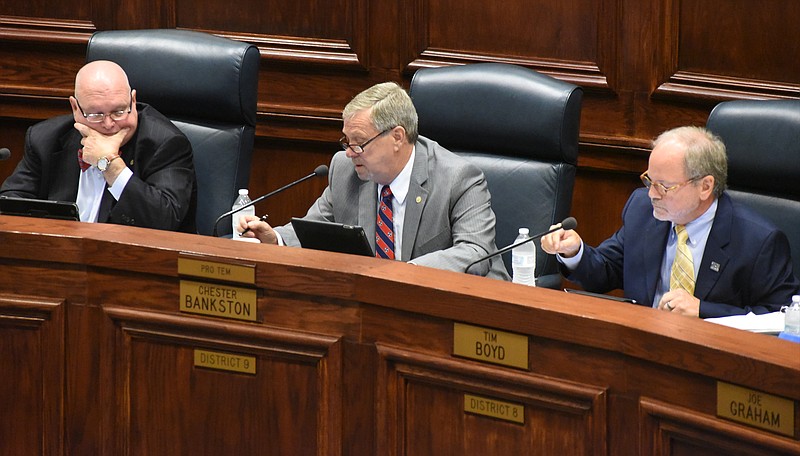Open meeting law concerns have led to the interruption of Commissioner Tim Boyd's plan to gather his colleagues' emailed thoughts on discretionary fund policies.
The issue came about after Mayor Jim Coppinger left commissioners' special project money out of last year's budget proposal and did so again for 2017.
Boyd said during a finance committee meeting in early May he would request the commission's legislative assistant to send emails to the other commissioners so he could gather their opinions regarding the budgeting of discretionary funds for each commissioner. He said the proposed email correspondence did not amount to a Tennessee Open Meeting Act violation because no deliberation would take place electronically.
The proposed emails were only for informational purposes, Boyd argued, and the public could review them upon request.
In response to a Times Free Press request for those emails, Commission Chairman Chester Bankston said Wednesday that no such emails were sent.
"I had it shut down as soon as I learned of it," Bankston said, explaining that the proposed email exchange violated the state's Open Meeting Act, also known as the Sunshine Law.
Boyd also said no emails were sent concerning discretionary funds.
"I was told it was a questionable violation of the Sunshine Law," he said.
Boyd said he would now like to have a special meeting in which commissioners could decide whether discretionary spending is a good policy and "put the matter to bed for once and for all."
If it is a good policy, we need to determine how discretionary money is funded and used, he said.
Last June, six commissioners - Chester Bankston, Tim Boyd, Randy Fairbanks, Jim Fields, Warren Mackey and Sabrena Smedley - voted to take $900,000 out of the county's $91 million general fund balance to use as discretionary money after Coppinger left it out of the 2016 budget proposal. No discussion took place; they just voted.
"I have so many projects in my district that just don't get funded outside of discretionary spending," Bankston said at the time, calling the measure "the right thing to do."
The same six commissioners later overrode Coppinger's veto of the amended budget.
A Tennessee government watchdog group has described discretionary money as a County Commission slush fund.
In January 2015, a number of county commissioners said they think the Sunshine Law prohibits frank discussion between elected officials.
"The sunshine law stinks. We ought to be able to talk. I've suggested time and time again that we talk, and that we don't get to the point where we look like we're so divided up here," Commissioner Greg Beck said.
Commissioners did not mention the absence of discretionary money during a Tuesday budget workshop or after they formally received the 2017 budget proposal during their Wednesday agenda session.
The 2017 budget timeline calls for the County Commission to vote on the proposal on June 29.
Contact staff writer Paul Leach at 423-757-6481 or pleach@timesfreepress.com. Follow on Twitter @pleach_tfp.
